| Srl | Item |
| 1 |
ID:
135542
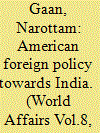

|
|
|
|
|
| Summary/Abstract |
This article contracts the American/Western judeo-Christian culture and its definition of the world with the traditional Asian/Eastern Indic perspective to explain major features of US policy towards developing countries in general and India in particular. American diplomacy so far has been dictated by the national belief in the superiority of biblical monotheism and US outreach is associated with the spread of judeo-christinity and the defeat of “paganism”. In the name of protecting religious freedom, the American government claims the right to monitor the status of religion in other countries and support Christian missionary organizations. This policy is also a tool to keep India and other countries in a subordinate role by expanding US influence in all field.
|
|
|
|
|
|
|
|
|
|
|
|
|
|
|
|
| 2 |
ID:
169216
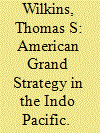

|
|
|
|
|
| Summary/Abstract |
In an era of heightened great power competition, debates about American grand strategy in the Indo-Pacific region have returned to the fore. This review essay looks at three recent volumes that directly address such debates. After introducing the concept of grand strategy, Part I reviews each of the books individually in sequence, outlining their scope, contents, and contributions. Part II then integrates the contribution of each of the volumes into a broader discussion relating to four pertinent issues: American perspectives on “Asia”; international relations (IR) theory; American strategic culture; and the rise of China, before concluding. The books under review are to differing degrees orientated toward one of the core IR theory paradigms: realism (Green), liberalism (Campbell), and constructivism/critical (Kang) approaches. As such, read together, they contribute to a multi-faceted theoretical understanding of US grand strategy in the Indo Pacific that will be of significant value to both scholars and practitioners.
|
|
|
|
|
|
|
|
|
|
|
|
|
|
|
|
| 3 |
ID:
113135
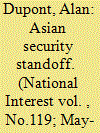

|
|
|
| 4 |
ID:
094671
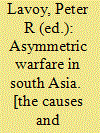

|
|
|
|
|
| Publication |
New Delhi, Cambridge University Press, 2010.
|
| Description |
xvii, 407p.
|
| Standard Number |
9780521193856
|
|
|
|
|
|
|
|
|
|
|
|
Copies: C:1/I:0,R:0,Q:0
Circulation
| Accession# | Call# | Current Location | Status | Policy | Location |
| 054861 | 954.6052/LAV 054861 | Main | On Shelf | General | |
|
|
|
|
| 5 |
ID:
121421
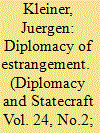

|
|
|
|
|
| Publication |
2013.
|
| Summary/Abstract |
Diplomatic correspondence between Washington and the American Embassy in Islamabad published by the National Security Archive shows that during the last 35 years of the twentieth century American diplomacy toward Pakistan faced a mutually de-escalating relationship. Pakistan wanted American economic and military assistance as well as support in its conflicts with India. The United States was ready to aid Pakistan, but only so far as Islamabad respected American demands. These focused on containing Soviet influence in the region and, more recently, fighting al-Qaeda and the Taliban. The United States also asked Pakistan to refrain from manufacturing nuclear weapons. To enforce this policy, successive American administrations showered Pakistan with sanctions. These sanctions were lifted again and again, because they undercut American diplomatic influence with the Pakistani government. Washington did not intend to support Pakistan in its conflicts with India. Pakistan let down the United States by not using its leverage over the Taliban to capture Osama Bin Laden. Mistrust resulting from this roller coaster relationship should have warned American diplomats not to take Pakistan's support in the war in Afghanistan against al-Qaeda and the Taliban for granted.
|
|
|
|
|
|
|
|
|
|
|
|
|
|
|
|
| 6 |
ID:
121486
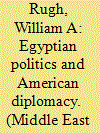

|
|
|
| 7 |
ID:
127181
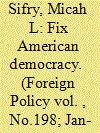

|
|
|
| 8 |
ID:
140680


|
|
|
|
|
| Publication |
New Delhi, prentice-Hall of India Private Limited, 1975.
|
| Description |
xxxviii, 339p.hbk
|
|
|
|
|
|
|
|
|
|
|
|
Copies: C:1/I:0,R:0,Q:0
Circulation
| Accession# | Call# | Current Location | Status | Policy | Location |
| 015384 | 973.92/ARO 015384 | Main | On Shelf | General | |
|
|
|
|
| 9 |
ID:
146813
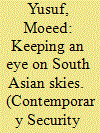

|
|
|
|
|
| Contents |
Since declaring their nuclear weapons capabilities in 1998, India and Pakistan have engaged in three major crises that each threatened to escalate into war. In each crisis, the USA engaged in active diplomacy to dissuade the South Asian rivals from taking escalatory actions. Previous literature on the crises has described the American role, but has not theorized third-party involvement in a nuclearized regional rivalry. We apply Timothy Crawford’s pivotal deterrence theory to the nuclearized India–Pakistan conflict, and extend the original theory to cover the novel condition of a non-superpower nuclear dyad, in the context of a single-superpower international system. We find that America’s pivotal deterrence generally enhanced stability in the India–Pakistan crises, and unlike in pre-nuclear South Asia, other great powers supported American diplomacy. However, we suggest that future regional crises between nuclear rivals, in South Asia or elsewhere, may present greater challenges for pivotal deterrence.
|
|
|
|
|
|
|
|
|
|
|
|
|
|
|
|
| 10 |
ID:
166160
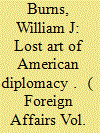

|
|
|
| 11 |
ID:
100270
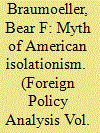

|
|
|
|
|
| Publication |
2010.
|
| Summary/Abstract |
International relations scholarship often describes America's foreign policy tradition as having isolationist tendencies or an isolationist dimension, a characterization derived most directly from American security policy in the 1920s and 1930s. This article offers a critique of this characterization. American diplomacy in the 1920s was subtle but ambitious and effective. American policy in the years leading up to the bombing of Pearl Harbor was in fact quite responsive to events on the European continent. In short, American isolationism is a myth.
|
|
|
|
|
|
|
|
|
|
|
|
|
|
|
|
| 12 |
ID:
127561
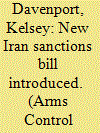

|
|
|
| 13 |
ID:
099985
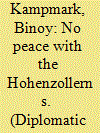

|
|
|
|
|
| Publication |
2010.
|
| Summary/Abstract |
The notion that a nation's 'people' are the sovereign arbiters of its affairs, exercising power through a representative leadership who govern in the name of public 'virtue', point to a concept of political legitimacy which has proven to be a guiding principle in American diplomacy. The Wilson administration's response to peace overtures by the German government between 1917 and 1918 is a good illustration of this tendency. In line with American domestic political mores and values, the Wilson administration, along with the U.S. Congress and American publicists sought to encourage a political reshaping of Germany through aggressive public diplomacy. This was achieved by apportioning war responsibility between sections of German society (guilty autocrats and subservient citizens). The legitimacy of the German state as an equal partner in international relations, was thereby questioned. This distinction, in time, collapsed showing the inconsistencies within the Wilson administration in challenging the internal workings of a foreign government.
|
|
|
|
|
|
|
|
|
|
|
|
|
|
|
|
| 14 |
ID:
132028
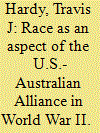

|
|
|
|
|
| Publication |
2014.
|
| Summary/Abstract |
World War II marked a watershed for American diplomatic practice as the nation moved away from its traditional ideas of unilateralism toward a foreign policy based on the construction of foreign alliances and relationships. Many of those relationships continue to be a central part of American diplomacy and one of the strongest is the American relationship with Australia. Historical study of the American-Australian alliance traditionally focused on how the alliance came into being because of the economic relationship between the two powers or because of the exigencies of World War II in the Pacific. What emerged from these studies was an overly simplistic understanding of what was dynamic and complex relationship between two states who often found themselves at cross-purposes. This essay points to the presence of a shared sense of racial identity among the general populaces and how this was utilized by policymakers to ameliorate the contentious nature of the alliance during the war. The creation of the American-Australian relationship was often as much driven by ideas of how the world was ordered as it was by the reality of events facing the two states during the war.
|
|
|
|
|
|
|
|
|
|
|
|
|
|
|
|
| 15 |
ID:
126350
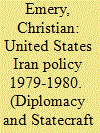

|
|
|
|
|
| Publication |
2013.
|
| Summary/Abstract |
The confrontation between the United States and Iran may now appear so ideologically entrenched and vitriolic that it is easy to lose sight of the importance that the United States placed on reaching an accommodation with the nascent Islamic Republic in 1979. Contrary to the claims of the current Iranian leadership, there was no instinctive American hostility. Rather than conspiring to bring down the nascent Islamic Republic, Washington fretted over Iran's fragility and saw its destabilisation as a likely precursor to Soviet adventurism in the Persian Gulf. The Carter Administration went to significant lengths to engage the new regime, but its good intentions were not enough. This analysis explores the misperceptions and faulty thinking that characterised the development and execution of Washington's engagement strategy. It then goes beyond the collapse of engagement to show how American objectives were refashioned after the hostage crisis and Soviet intervention in Afghanistan.
|
|
|
|
|
|
|
|
|
|
|
|
|
|
|
|